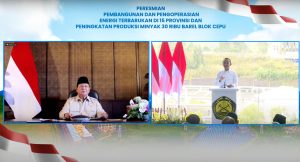Jakarta – The #BersihkanBankmu or ’clean your bank’ civil society coalition encourages banks to stop financing fossil fuels. In its report, this coalition revealed that bank funding to the coal sector is still significant, even though the government has targeted an energy transition to reduce carbon emissions.
Executive Director of the Center for Economic and Law Studies (CELIOS), Bhima Yudhistira, said in a press release on Tuesday, December 10, that the cost of renewable energy continues to decline, making it a more competitive option than coal-based power plants. “For example, investment in solar power plants is estimated to be only USD 410 per kilowatt in 2050, much lower than ultra-supercritical power plants, which reach USD 1,430 per kilowatt,” he explained.
“Financing the coal sector not only contradicts the energy transition commitment but also risks the financial stability of the banks themselves. As global pressure to abandon fossil energy increases, financed assets can turn into stranded assets,” Bhima said.
According to the coalition’s latest report, five major national banks, namely BRI, BNI, BCA, Mandiri, and Permata, recorded financing of up to USD 5.42 billion and IDR 5.37 trillion to the coal sector between 2016 and 2023. PT Adaro Indonesia Tbk became the largest credit recipient, with a total of USD 1.94 billion and IDR 2.5 trillion.
Bhima also encouraged banks to provide special credit schemes for renewable energy projects, such as interest subsidies for financing community-scale plants. “This step not only supports the energy transition but also opens up new, more sustainable business opportunities for banks,” he added.
Role of regulators and green taxonomy policy
The #BersihkanBankmu coalition also demands the Financial Services Authority (OJK) as a regulator to be more assertive in encouraging banks to reduce fossil energy financing. According to them, the Indonesian Sustainable Finance Taxonomy (TKBI) policy issued by OJK is not progressive enough.
“Removing the red classification in the TKBI document gives a confusing signal. This can make activities previously considered not environmentally friendly fall into the transition or even green category without significant improvement,” said Linda Rosalina, Executive Director of TuK Indonesia.
According to Linda, TKBI should be a more assertive tool in distinguishing between truly green economic activities and those that are still classified as transitional. “If there is no strengthening, Indonesia will be left far behind compared to other countries in the region that are more aggressive in implementing green financing,” she said.
Meanwhile, CERAH’s Just Energy Transition Associate, Wicaksono Gitawan, emphasised the importance of concrete steps from banks in supporting the government’s target to close coal-fired power plants by 2040.
“If banks do not immediately stop funding the coal sector, the long-term financial risks will be even greater. President Prabowo’s statement about accelerating the termination of PLTU should be seen as a serious warning to the banking sector,” he said.
He added that the energy transition is not just a moral demand but also a big business opportunity. “Investment in renewable energy is the future. If national banks do not take steps now, they will lose this momentum,” concluded Wicaksono. (Hartatik)














